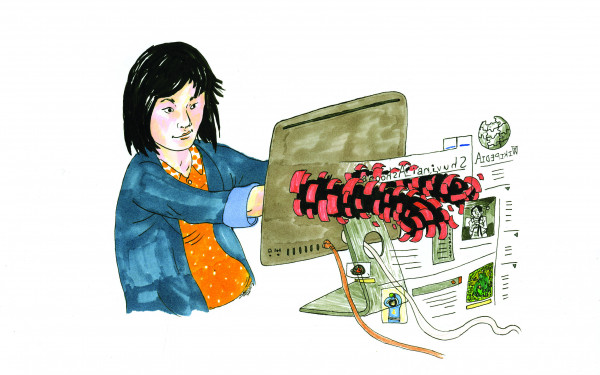Concordia’s Data Haven
While social progressiveness is no foreign concept to the Concordia culture, a disturbing issue remains unaddressed: students have found themselves arbitrarily cut off from their Concordia Internet access on campus.
“People are being disconnected without warning. Sometimes, you literally require the Internet to do your schoolwork.” says A.J. West, a Concordia Film Production student. Concordia’s Instructional & Information Technology Services claim that the disconnects have to do with students downloading pirated software and movies.
West claims that the policy is arbitrary. “It’s really unclear as to what the rules are. We can’t even find the rules, let alone follow them.” Exasperated by Concordia’s unclear policy and pervasive Internet curtaining, West decided to take matters into his own hands.
As a resident assistant at Concordia’s Grey Nuns Residence, West attempted to set up a local file-sharing server for Concordia students. He hoped that his local server would divert Concordia students from using BitTorrent to sharing files on Concordia’s internal network instead.
West’s plan worked wonders. Capable of handling terabytes of data exclusively between Concordia students, the server provided a file-sharing haven that students could use without bothering with Concordia’s Internet.
The server ran for months. At one point, “the hard disks couldn’t spin fast enough to keep up with the demand,” West recalls.
Predictably, West’s data fortress was short-lived. After a few months of operation, West was called to the IITS office, where he was informed that he would need to shut down his server and remove all data stored on it.
The reason? IITS claimed that West’s server was congesting local bandwidth.
“I told them that this is exactly what they should want,” West recalled replying. “The entire point was to prevent overuse of Internet bandwidth and have things handled by the local network instead.”
But the IITS refused to listen. With an unclear policy on Internet censorship and a lag on progressiveness in terms of campus file sharing, it seems clear that something needs to be done at Concordia.
I propose an open file sharing solution for Concordia.
While AJ West’s solution was shot down for the same reason it was conceived, there is still hope for a decentralized file sharing solution to be made available for all Concordia students.
Imagine an open file-sharing network, limited within Concordia that could be voluntarily run on any student’s laptop. The network would mesh together files shared between all Concordia students and allow for an open, voluntary and decentralized free flow of information within campus.
While the IITS can shut down a single server, blaming it for congestion, it would be impossible to shut down a giant mesh of free information flow.
This is the problem that is being posed to all Concordia students that want to see their university shine in the realm of freedom of information, myself and A.J. West included. In the coming weeks, we hope to advance research to solve this problem.
With a restrictive, ambiguous Internet policy, and an anti-progressive Internet staff, it seems that attempting to rely on the IITS to provide Concordia with an information sharing solution will be fruitless.
It’s time for Concordia students to take matters into their own hands.

web_1_900_665_90.jpg)



__600_375_90_s_c1.jpg)

